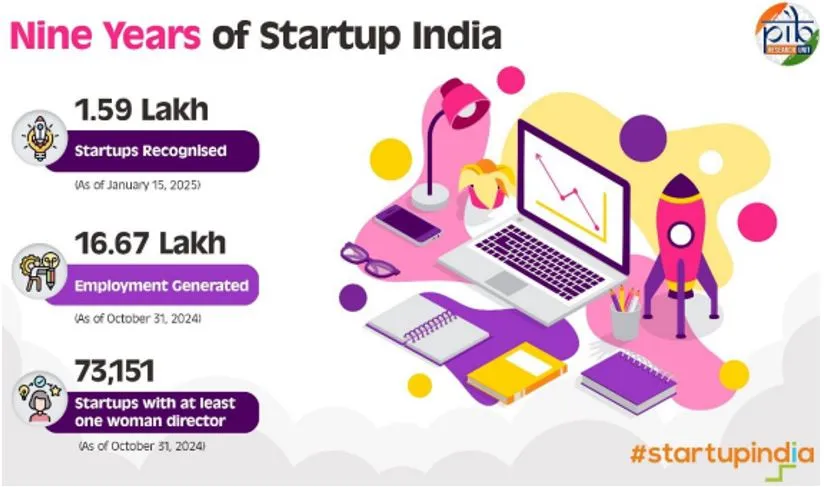

16th January 2025 (15 Topics)
Context
On January 16, 2025, India marks nine years of Startup India, a transformative journey that began in 2016.
What is Startup India?
- Launched in: 2016
- Startup India is a flagship initiative of the Government of India, intended to catalyse startup culture and build a strong and inclusive ecosystem for innovation and entrepreneurship in India.
- Startup India has rolled out several programs with the objective of supporting entrepreneurs, and transforming India into a country of job creators instead of job seekers.
- These programs are managed by a dedicated Startup India Team, which reports to The Department for Promotion of Industry and Internal Trade (DPIIT).
- While the DPIIT heads the initiative, five government departments — the Department of Science and Technology (DST), Department of Biotechnology (DBT), Ministry of Human Resource Development (MHRD), Ministry of Labour and Employment, Ministry of Corporate Affairs (MCA), and NITI Aayog— are primarily responsible for the initiatives under Startup India.
Milestones and Achievements
- Startup India has been instrumental in nurturing startups, with DPIIT-recognized startups growing from around 500 in 2016 to 1,59,157 in 2025.
- Today, India is the world’s third biggest startup hotspot.
- At the time of Startup India’s launch, startups came up in only 120 districts. Today, there are more than 750 districts boasting startups, and the central government’s goal is to ensure cent per cent district coverage by the end of 2025.
- Over 6 lakh direct jobs have been created through recognized startups, with sectors like IT services, healthcare, and professional services leading in job creation.
- Women entrepreneurs have made significant strides, with 73,151 startups having at least one woman director.
- Unicorns in India have surged as well, going from only eight in 2016 to an impressive 118 in 2024. These unicorns – startups valued at USD 1 billion or more and not yet publicly listed – highlight the remarkable growth of the ecosystem.
Benefits of Startups for the Indian Economy
- Opportunities for Youth: Startups provide a platform for India’s entrepreneurial youth to turn their ideas into reality. This can lead to exponential growth in finances, creating wealth that is closely linked with startup success.
- Wealth Creation: Startups are increasingly seen as a path to wealth creation. As these new businesses grow, they help generate both personal wealth for entrepreneurs and broader economic growth.
- Employment Generation: The establishment of a startup brings with it new employment opportunities. Startups often require a range of talent, leading to job creation across various sectors.
- Catering to Underserved Sections: Many startups are focused on addressing the needs of underserved populations. For example, the rise of e-commerce platforms has allowed traditional artisans and small businesses to reach a wider audience, thus improving their economic position.
Why Startups are Not a Complete Solution to India’s Economic Challenges?
- Short-Term Sustainability: Statistically, a significant number of startups do not succeed and shut down within a short time. This leads to a waste of investment and resources.
- Economic Impact of Failures: The closure of startups can result in the loss of invested capital and jobs, negatively affecting the economy. It can also demotivate other aspiring entrepreneurs, making them hesitant to start their own ventures.
- Disparities in the Startup Ecosystem: Within startups, salary disparities and poor working conditions are common, creating an unequal working environment that affects employee morale and productivity.
- Lack of Regulation: The startup sector is relatively unregulated, which means there are fewer labor laws protecting employees. This can lead to the exploitation of workers who often lack benefits such as health insurance or retirement plans.
Key Challenges Faced by Indian Startups
- Valuation and IPO Issues: Many startups struggle with proper valuation, which affects their ability to secure investments and go public through Initial Public Offerings (IPOs). The volatile market conditions and shifting investor sentiments in 2023 have exacerbated this problem.
- Access to Capital: Securing adequate funding remains a major challenge for startups in India. The process of raising funds is often difficult and time-consuming, which slows down their growth and hampers innovation.
- Investor Risk Aversion: Due to uncertain market conditions and macroeconomic pressures, investors tend to be more risk-averse, making it harder for startups to attract the necessary capital to scale their businesses.
- Sustainability of Revenue Models: Many startups struggle to find sustainable business models that can generate consistent revenue. Achieving profitability is often a long and challenging process, leading to uncertainty about the long-term viability of these businesses.
- Lack of Support: Startups often lack access to adequate physical infrastructure, technological resources, and mentorship. Additionally, limited networking opportunities hinder the growth potential of many businesses.
- Complex Regulatory Framework: Navigating India's complex regulatory and tax systems creates significant operational challenges for startups. The bureaucratic hurdles and inconsistent enforcement of laws make it difficult for many entrepreneurs to focus on business development.
Government initiatives and policies to nurture the startup ecosystem
Ministry-wise Initiatives
|



